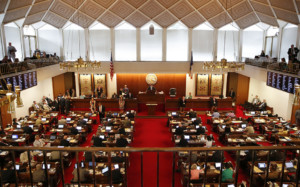 North Carolina has officially launched a new agency to oversee $200 billion in public funds, marking one of the most significant changes to state financial management in decades.
North Carolina has officially launched a new agency to oversee $200 billion in public funds, marking one of the most significant changes to state financial management in decades.
The North Carolina Investment Authority (NCIA), created through legislation earlier this year, held its first meeting this week.
“Today was a big day for North Carolina’s future,” said Treasurer Brad Briner in a press release. “The shift toward board governance and away from the sole fiduciary model will allow us to maximize returns for the people of North Carolina.”
The agency consolidates oversight of the North Carolina Retirement Systems, cash management, and other public funds, which currently serve over one million members and distribute about $640 million in monthly benefits.
Leadership and Structure
State Treasurer Brad Briner, who previously held sole authority over the state’s investments, now chairs the five-member NCIA board. Other members include Dan Ward, nominated by the Senate, and Mark Roberts, nominated by the House. Briner also announced his nominee, Stephanie Lynch, a veteran investment officer with experience managing endowments, who will require confirmation by the General Assembly. The governor will appoint the fifth member.
The board voted to name Kevin SigRist as interim chief investment officer. SigRist is currently CIO for the Department of State Treasurer’s Investment Management Division.
Next Steps

The NCIA will reconvene on November 19 to finalize policies and charters before the new structure takes effect on January 1, 2026. Officials say the board’s oversight will modernize state investment practices, improve planning, and potentially reduce costs by streamlining operations across its 52,000-square-mile service area.
Cryptocurrency Debate
Alongside the new agency, lawmakers are debating House Bill 92, which could allow up to 5% of the state’s portfolio to be invested in cryptocurrency. The proposal restricts investments to crypto equivalents of mutual funds, avoiding direct purchases of individual digital currencies like Bitcoin.
Supporters argue this approach positions North Carolina to benefit from a growing market, while critics warn of volatility and risks to pension security. The bill also proposes studying a digital asset “strategic reserve” and giving state employees the option to direct part of their retirement savings into crypto-based investments.
Broader Impact
The move places North Carolina among a small number of states exploring digital assets as part of their investment strategies. However, final authority depends on General Assembly approval and regulatory safeguards from both state and federal agencies.


